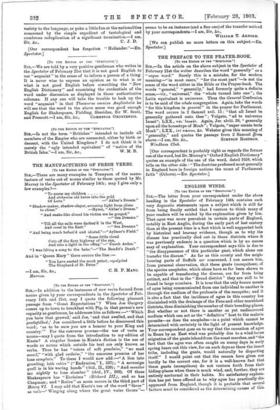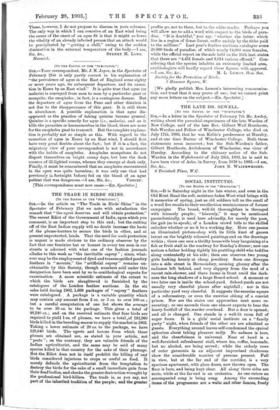ENGLISH WINDS.
[To THE EDITOR OP THE "SPF.CTATOR." J SIR,—The letter from your correspondent under the above heading in the Spectator of February 14th contains such very dogmatic statements upon a subject which is still far from being finally settled that I venture to think many of your readers will be misled by the explanation given by him. That ague was more prevalent in certain parts of England, notably in East Anglia, during the early part of last century than at the present time is a fact which is well supported both by historical and hearsay evidence, though as to why, the disease has practically died out in those districts where it was previously endemic is a question which is by no means easy of explanation. Your correspondent says this is due to "the disappearance of this particular gnat, which alone can transfer the disease." As far as this county and the neigh- bouring parts of Suffolk are concerned, I can assure him, from personal observation, that these gnats (mosquitoes), of the species anopheles, which alone have so far been shown to be capable of transferring the disease, are far from being extinct, and that in the " Broad district " they are still to be found in large numbers. It is true that the only known means of ague being communicated from one individual to another is through the medium of the proboscis of the mosquito; and it is also a fact that the incidence of ague in this country has diminished with the drainage of the Fens and other marshland districts, thus diminishing the number of their breeding-places. But whether or not there is another as yet undiscovered medium which can act as the "definitive" host to the malaria parasite—as does the anopheles—is a point which cannot be determined with certainty in the light of present knowledge. Your correspondent goes on to say that the causation of ague in Essex by an East wind was probably due to a wind-borne migration of the gnats inland from the coast marshes, and "the fact that the ague was often caught on sunny days in early spring bears out this view, for on such days as these the insect tribe, including the gnats, would naturally be disporting itself." I would point out that the reason here given can hardly be the correct one, for it is a well-known fact that these gnats (mosquitoes) do not venture forth from their hiding-places when there is much wind, and, further, they are entirely nocturnal in their habits. No satisfactory explana- tion has yet been offered as to why ague has practically dis- appeared from England, though it is probable that several factors must be considered as the determining causes of this.
These, however, I do not propose to discuss in your columns. The only way in which I can conceive.of an East wind being the cause of the onset of an ague fit is that it might so lower the vitality of an already infected person that an attack would be precipitated by " getting a chill," owing to the sudden diminution in the external temperature of the body.—I am,











































 Previous page
Previous page